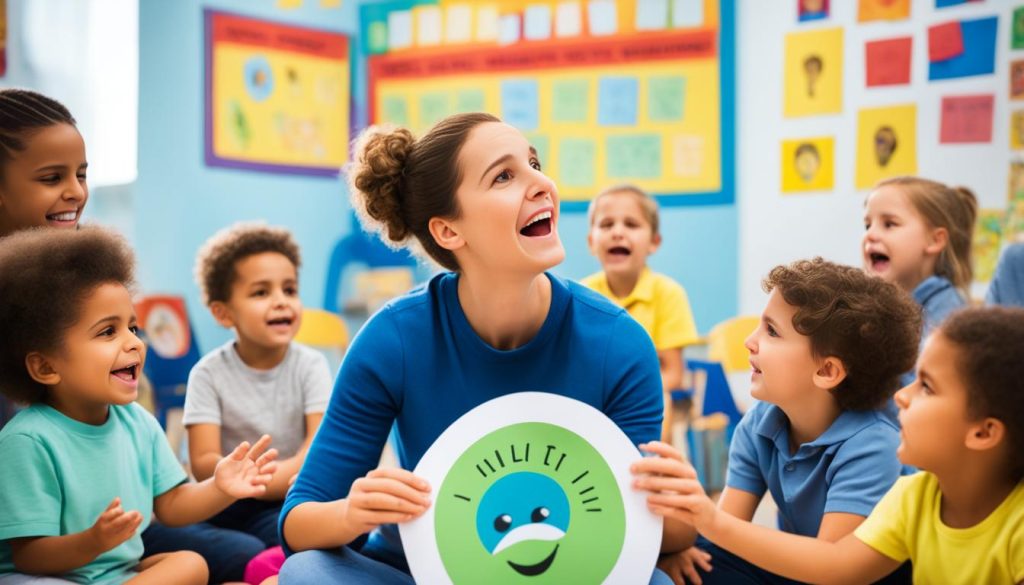Think back to your own childhood. Remember that one time you felt incredibly sad or angry, yet didn’t have the words to express it? Now let’s imagine giving our children the tools we were once deprived of. These tools could transform their emotional world and help them navigate life’s challenges better. Emotional intelligence (EI) is more than just understanding emotions. It helps your kids manage their feelings and build strong relationships.
Research shows that kids as young as four start to block out things that upset them. By age ten, they use advanced ways to control their emotions. This self-control is key to doing well in school and being kind to others. As parents, you play a big part in helping your kids grow, especially with positive parenting and teaching them social skills.
It’s not just about giving them things or resources. It’s about giving them real emotional experiences. When you encourage them to talk about their feelings, they feel safer and more secure. This helps them develop emotional intelligence. Let’s explore how we can help our kids grow this important quality that affects their future.
Key Takeaways
- Emotional intelligence is critical for a child’s overall development and future success.
- By age four, children start using strategies to manage emotional disturbances.
- Self-control is a stronger predictor of success than IQ or socioeconomic status.
- Positive reinforcement parenting can enhance a child’s emotional skills.
- Teaching and modeling empathy play a crucial role in developing emotional intelligence.
Understanding Emotional Intelligence in Children
Emotional intelligence (EI) in kids means they can handle their feelings well and understand others. It includes knowing how they feel, being able to describe those feelings, and caring for others. Starting to build emotional intelligence early helps kids deal with social and personal challenges.
What is Emotional Intelligence?
Kids with emotional intelligence can spot their feelings, figure out why they feel that way, and control those feelings. They might express, repress, or get angry with their emotions. Learning to manage feelings is key to EI, helping kids deal with stress and solve problems.
Importance of Emotional Intelligence for Child Development
Emotional intelligence is very important for kids. It helps them grow and learn better in a safe place. Schools like Woodline Primary in Geelong work on EI, thinking positively, critical thinking, and bouncing back from tough times.
Teaching kids about emotional intelligence helps them reach important milestones. It makes them handle tantrums better and be more creative. This leads to better relationships, less stress, and solving conflicts well, important for life and work.

Starting with emotional intelligence early shapes a child’s whole development. By teaching kids about feelings, parents help them become more empathetic, self-aware, and socially skilled. These skills are vital for life.
Why Teaching Emotional Intelligence Matters
Teaching emotional intelligence (EQ) is key for your child’s growth and success. EQ makes up over 54% of what makes someone successful. It affects relationships, how well someone does their job, their health, and their life quality. This shows why EQ is vital in lifelong learning for kids.

Kids with high EQ do better in school, stay in school longer, and make healthier choices. Programs like RULER from the Yale Center for Emotional Intelligence show that boosting EQ helps in many areas. These include better social skills, doing well in school, leading others, and being more productive. RULER also helps reduce stress, depression, and bullying.
Impact on Future Success
EQ is a stronger predictor of success than IQ or social class. Kids with strong EQ skills manage their feelings and impulses better. This is key for doing well in school and getting along with others. Studies show that kids of parents who use empathy and validation are more resilient and do better in school. Even babies as young as ten months old benefit from being understood and valued, showing the importance of early EQ teaching.
Role in Social Relationships
High EQ in kids helps them make better friends and build strong social connections. These connections are linked to being healthier, wealthier, happier, living longer, and even the success of their own kids. Activities like mindfulness and yoga help kids control their feelings better. This supports teaching discipline in a way that helps kids get along with others and understand people better.
The following table summarizes the key benefits and outcomes of high emotional intelligence in children:
| Key Benefits | Outcomes |
|---|---|
| Improved Academic Performance | Higher Grades, Increased School Retention |
| Enhanced Social Skills | Positive Relationships, Effective Communication |
| Better Emotional Regulation | Reduced Anxiety, Lower Instances of Bullying |
| Future Success | Health, Wealth, Happiness, Longevity |
These benefits show how important it is to teach emotional intelligence. It helps raise kind kids and sets them up for success. Social skills and discipline get better with a strong EQ.
Effective Parenting Strategies for Fostering Emotional Intelligence
Using the right parenting strategies is key to helping your kids develop emotional smarts. Research shows that kids who learn about emotions from their parents do better in life. Dr. John Gottman suggests emotion coaching as a way to teach your child about feelings. This method means understanding and naming your child’s feelings to teach them, not just to punish.

Emotion coaching is different from other parenting styles that ignore or don’t accept a child’s feelings. It’s all about being empathetic and helping your child solve problems. This way, you build a stronger bond with your child and teach them to respect others.
Children with high emotional smarts do better in life. They make better friends, work well in teams, and solve problems better. It’s important for parents to be consistent in how they parent to help build these skills. This helps kids handle their feelings well, which is good for their mental health and decision-making in tough times.
Dealing with sibling rivalry is another area where emotional smarts are key. Teaching siblings to understand and be kind to each other helps them learn to solve problems and manage feelings. This reduces fights between siblings and sets them up for better relationships as adults.
Also, helping your kids understand and deal with their feelings is crucial. Being a responsive parent means meeting your child’s emotional needs. Alyssa Campbell, CEO and co-author, says it’s important to help kids regulate their feelings before they can think things through. This helps them stay calm and think clearly when they’re upset.
By using these methods, you’re not just solving immediate problems. You’re building a strong foundation for your child’s emotional intelligence. This kind of parenting leads to kids who are resilient, empathetic, and emotionally smart for life.
Building Self-Awareness in Children
Self-awareness is key for kids to know, understand, and handle their feelings. This skill is linked to emotional smarts and happiness. Parents are vital in teaching kids to spot and talk about their feelings.
Helping Kids Recognize Their Emotions
Knowing their feelings is the first step in self-awareness. Kids who know their emotions do better in school and with friends. Asking “How do you feel about that?” helps them explore their feelings.
This method boosts mental health and encourages creativity. It helps kids deal with stress and anxiety. Supporting child mental health through self-awareness lowers anxiety and improves social skills. It also teaches empathy and compassion, key for social success.
Strategies for Verbalizing Feelings
After kids know their feelings, they need to say them out loud. Teaching them to talk about feelings improves manners and emotional smarts. Using “I” statements, like “I feel upset when,” helps them speak their minds respectfully.
Tools like the “Bug and a Wish” method help kids put their feelings into words. Kids who share their feelings are more likely to lead and connect well with others. Activities like journaling and self-reflection boost self-awareness too.
Parents should model good emotional expression for their kids. Understanding brain functions and emotions helps kids see why they feel certain ways. This aids in their emotional growth.

Encouraging kids to express feelings supports empathy and critical thinking. Kids with strong self-awareness do well in school and with friends. Parents can greatly influence their child’s emotional and social growth by valuing emotional expression.
Encouraging Empathy and Compassion
Empathy and compassion are key traits that can grow in kids through different strategies and activities. By letting kids try out hobbies and join community service, they learn more about others. Let’s look at some ways to teach empathy and why it’s important to show good behavior.
Activities to Teach Empathy
Doing fun activities helps teach empathy. Kids can learn by acting out different situations to feel what others feel. Joining community service projects is also great. It helps kids understand compassion by working with people from different backgrounds.
Reading books about characters facing challenges or being kind can also help. Talking about tough choices and different social situations makes kids value other views. Teaching kids about money can show them why helping others is important.
The Role of Model Behavior
Parents are key in teaching kids to be kind by being empathetic themselves. When parents listen and accept their child’s feelings, kids learn to be compassionate. Kids copy what they see, so showing empathy helps them be more understanding too. Helping kids get along with friends also boosts their social skills.
Making sure kids watch positive media helps them learn to be kind. Encouraging them to notice how others look and act helps them understand feelings better. Teaching family empathy sets a good example for kids to be caring and kind adults.
| Age Group | Empathy Development Activities | Parental Role |
|---|---|---|
| 4-6 years | Understanding hurt, sharing, and taking turns | Modeling kindness, reading empathetic stories |
| 7-9 years | Role-playing, community service | Engaging in open discussions, positive media exposure |
| 10+ years | Ethical dilemmas, cultural exposure | Active listening, validating feelings |
As kids get older, they can understand empathy and compassion better. By mixing fun hobbies and structured activities into their days, you can help these traits grow naturally. Teaching family empathy and doing kind actions together helps kids become caring and ready for social challenges.
Promoting Positive Parent-Child Communication
Positive Parent-Child Communication is key to raising emotionally smart kids. It means making a safe space for kids to share their feelings and thoughts. This builds a strong connection between parents and kids, helping their emotional growth and happiness.
Creating an Open Communication Environment
It’s important to make a space where kids feel free to talk. Spend quality time with your kids to build trust and respect. This shows them you’re there to listen, making them feel important and valued.
Family traditions and rituals help with open talks. These moments let parents and kids connect and share feelings. It helps kids feel confident and independent.
Listening and Validating Emotions
Listening and understanding your child’s feelings is key in positive parenting. It makes your bond stronger and boosts their self-esteem and emotional smarts. Showing you care through eye contact and talking their language tells them their feelings count.
Parents who listen and validate their kids tend to have kids who talk openly. This open chat helps kids see themselves and their family in a positive light. It also teaches them their opinions matter, helping them become independent.
“The way we talk to our children becomes their inner voice.” – Peggy O’Mara
Using these communication tips can make family life better. Focusing on family customs and positive parenting builds a place where everyone respects and cares for each other. It shows that family is a place of love and support.
- Engage in regular one-on-one time to foster trust and respect
- Use open-ended questions to encourage meaningful conversations
- Show acceptance through verbal and nonverbal cues
- Validate your child’s feelings to strengthen your bond
| Aspect | Outcome |
|---|---|
| Positive Parent-Child Communication | Improved relationship dynamics |
| Fostering Child Independence | Enhanced self-esteem and confidence |
| Positive Reinforcement Parenting | Better behavioral outcomes |
| Strengthening Parent-Child Bond | Developed emotional intelligence |
| Family Traditions and Rituals | Foundations of trust and security |
Teach Problem-Solving Skills
Problem-solving skills are key for kids to develop good habits, understand their feelings, and learn responsibility. These skills start early and grow as kids get older. As a parent, you can help your child get better at solving daily challenges.
Problem-Focused Coping Techniques
Problem-focused coping means figuring out the issue and making a plan to solve it. Begin by helping your child clearly state the problem. Then, brainstorm solutions, pick the best one, try it, and see how it goes. Showing them how you solve problems can really help them learn.
Letting kids join in on family problem-solving can make them feel more involved. It also helps them think more critically.
Emotion-Focused Coping Techniques
Emotion-focused coping helps kids deal with stress from problems. It teaches them to calm down before tackling tough tasks, which boosts their emotional smarts. Tools like emotion coaching can help kids start thinking about solving problems.
Creative activities like making crafts and reading stories about characters solving problems can make learning fun. Asking open-ended questions gets kids to think deeply and see things from different angles.
Encouraging kids to solve problems helps them feel more confident and independent. Praising their effort, not just the outcome, shows them that trying is important. Creating a safe space where kids can make mistakes and learn from them prepares them for life in many areas.
The Role of Play in Developing Emotional Intelligence
Play is key in child development, shaping their emotional smarts. Elizabeth Sautter, a speech and language expert, says play lays the groundwork for learning, including emotional learning. Through play, kids pick up vital skills for handling feelings and getting along with others.
Benefits of Outdoor Play
Outdoor play boosts emotional smarts in many ways. It lets kids explore, make choices, and take risks, helping them manage their feelings. Activities like jumping and spinning help with making decisions and controlling emotions, giving them a way to express feelings.
Nature play also makes kids value the environment and learn about the natural world. This can make them calmer and more caring towards others.
Interactive Games for Emotional Learning
Interactive games are great for learning emotions. They teach kids about empathy, sharing, and working together. Games like “Telephone” and “Simon Says” improve communication and social skills.
Games like “Red Light, Green Light” and “Freeze Tag” help with controlling impulses and staying focused. Playing these games with kids at their level makes them more engaged and effective. These games are fun and teach important emotional skills like empathy and self-control.
Play-based learning gives kids more than fun. It helps them develop emotionally. It connects their world with ours, teaching through self-expression and peer interaction.
The Impact of Setting Boundaries with Kids
Setting boundaries with kids helps them grow emotionally. It gives them clear rules and limits. This makes it easier for them to understand what’s okay and what’s not.
It’s important to make sure these boundaries fit the child’s age. This makes them easier to understand and follow. Setting these rules helps kids learn to respect others and control themselves.
Many parents worry about managing screen time. With so many devices around, it’s key to set limits. Setting the right amount of screen time helps prevent negative effects and encourages kids to do other things.
Effective discipline strategies are key to teaching kids responsibility. It’s important to use positive reinforcement, not just praise. This way, kids know exactly what they did right. It helps them make better choices and control themselves better.
Setting clear rules for mealtime and bedtime helps kids behave better. Regular routines teach them what to expect. This leads to better eating habits and enough sleep. Studies show that kids do better emotionally with consistent routines.
Parents are role models for setting and respecting boundaries. Kids learn a lot by watching how parents act. Showing kids how to set and follow boundaries helps them understand it better. It’s a hands-on way of teaching them.
Teaching kids about their personal space and physical boundaries is crucial. Explaining the reasons behind rules helps them think critically. This not only teaches them to respect others but also helps them feel more confident in social situations.
| Key Aspects | Details |
|---|---|
| Age-Appropriate Boundaries | Tailoring boundaries to match developmental stages ensures they are understood and effective. |
| Managing Screen Time | Setting limits on digital device usage to promote healthier lifestyle choices. |
| Effective Discipline Strategies | Positive reinforcement and specific praise encourage good behavior and self-discipline. |
| Mealtime and Bedtime Routines | Consistent boundaries during these times improve cooperation and overall well-being. |
| Parental Modeling | Parents leading by example teach children the importance of setting and respecting boundaries. |
| Communication Strategies | Clear explanations of rules enhance understanding and critical thinking in children. |
Parenting and Raising Kids with Emotional Intelligence
Raising kids with emotional intelligence greatly helps their growth and future success. Using consistent parenting methods can really help a child manage their feelings and build strong relationships.
Consistency in Parenting Approaches
Being consistent in parenting is key to helping kids develop emotional smarts. Positive reinforcement parenting rewards good actions and shows kids the effects of their choices. Clear rules and sticking to them make a safe space for kids.
Dr. John Gottman found that managing feelings and knowing them well is key to a child’s happiness and success. This is even more important than their IQ. Make sure these ideas guide your parenting to help your child’s emotional smarts.
The Long-Term Benefits
Parenting with emotional intelligence has big long-term rewards. Kids from emotionally smart homes are 85% more likely to have good mental health, strong relationships, and fulfilling careers. By understanding and accepting your child’s feelings, you boost their mental health and make them feel safe and understood.
A 19-year study by Jones et al. (2015) in the American Journal of Public Health shows that social-emotional skills at age 5 predict future success. Getting a college degree or a steady job by age 25 is more likely. This shows why emotional intelligence is crucial from the start.
Using emotion coaching to help your kids through their feelings builds their resilience. This method of positive reinforcement parenting supports child mental health. It prepares them for the many challenges they’ll face as adults.
Conclusion
Teaching your kids about emotional intelligence sets them up for a happy and successful life. By teaching them to understand emotions, be empathetic, solve problems, and communicate well, you help them grow. This approach also helps them do better in school and feel good about themselves.
Parents play a huge part in this process. Dads, aged 34 to 58, and moms, aged 29 to 58, each bring their own strengths. Moms focus on emotional bonds and teaching values. Dads teach kids about responsibility, honesty, and respect.
They also stress the importance of talking openly, avoiding harsh words, and letting kids make their own choices. These lessons help kids manage their feelings and make friends.
Studies back up the benefits of these methods. They show that loving and attentive parenting helps kids think better and control their feelings from a young age. Also, being a positive parent shields kids from feeling overwhelmed or pressured by others. These strategies boost emotional smarts and reduce the chances of feeling sad, anxious, or angry.
In short, teaching kids about emotional intelligence through positive parenting is key to their happiness and success. By doing this, you’re not just helping your child now. You’re setting them up for a life full of learning and good relationships.
FAQ
What is Emotional Intelligence?
How important is emotional intelligence for child development?
How does teaching emotional intelligence affect future success?
What role does emotional intelligence play in social relationships?
What are some effective parenting strategies for fostering emotional intelligence?
How can parents help children recognize their emotions?
What activities foster empathy and compassion in children?
How can parents promote positive communication with their children?
What problem-solving skills should parents teach their children?
What are the benefits of outdoor play for emotional intelligence?
How does setting boundaries with kids impact their emotional intelligence?
What are the long-term benefits of raising children with emotional intelligence?
This post contains affiliate links. If you click on a link and make a purchase, I may earn a small commission — at no extra cost to you. Thank you for supporting this blog and helping me keep the patterns free! Read the full Affiliate Disclosure & Transparency.
